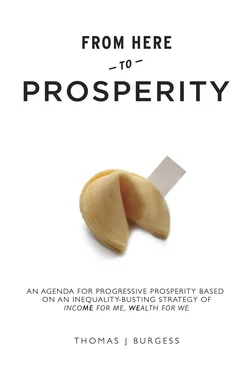Income tax to be abolished: Income and payroll taxes significantly reduce the disposable income of the low and middle earners bringing financial pressure and undermining their quality of life. The 80% of UK taxpayers earning below £32,000 and 70% of Americans earning below $50,000 could be freed from income-related taxes, giving each a significant pay rise and stimulating the economy whilst reducing pressure on the welfare budget. The impact on government revenue is small and could be made up in a more equitable manner from the wealth we generate collectively. The impact on disposable income would gradually be improved as, currently, low-income groups, whose pay packets are reduced by taxation, are compensated by tax credits and welfare, requiring a costly bureaucracy taking away with one hand and giving back with another. Overall, it is reasonable to conclude that income taxes, in relation to the lower paid, are expensive to collect for the community as a whole, and self-defeating, as reducing these taxes would almost certainly lead to a degree of economic expansion, and higher tax revenues overall. Progressive taxes on income would still be retained for higher earners, but deliberately rebranded as insurance payments as they would go towards funding health and welfare for all.
A tax based on personal assets to be introduced: As we all participate in wealth creation, the fruits should be shared more equitably, reducing extreme inequality. This does not happen today: on the contrary, the economy performs in such a way that wealth flows from the poor towards the rich. In the USA, the top 1% own more than 40% of the nation’s wealth, in the UK, the country’s five richest families now own more wealth, than the poorest 20% of the population. Some of this excessive wealth could be returned to those that helped create it through a low percentage tax on all assets over a certain threshold. This percentage would still be less than the expected increase in asset value so the rich would still get richer, but by not quite so much, and more funds would be put into circulation for the benefit of all.
Infrastructure investment to be funded through reformed property tax: Changing the way the out of date property taxes are levied so there is more equitable means of collecting payment for all public services. This could be based on the market or locational value of the land only, and could make infrastructure projects self-financing. As improved infrastructure raises adjoining land values, a Land Value Tax (LVT) based on the market value of each site, would enable government expenditure to be recouped automatically from rising land values, as well as providing more funds for public services. As the rich occupy the most valuable sites, with the most locational advantages provided by society as a whole, they would contribute more to public revenue through what I prefer to describe as a Land Usage Charge but in return for valuable benefits. Firms occupying the best sites and enjoying the greatest advantages would pay more for the privilege. Current property taxes penalise improvements, whereas land use charges encourage best use. Land hoarding and speculation would become unprofitable, and the scope for moving profits off-shore would be reduced. Some transitional relief might be required initially for property owners with a valuable property but low income.
The wealth created to be shared through encouraging greater corporate responsibility: Enterprises, which bring together capital and labour, create wealth, which should be shared more equitably with all the stakeholders, not just the shareholders. By changing the way we raise public revenue from business, we can ensure that the wealth created benefits all. So instead of all the gains going to the shareholders, more of this will go to stakeholders by means of ‘social offsetting’ as socially responsible companies will contribute less from their profits/wealth to public revenue. This encourages social responsibility while still respecting the profit motive. It could put an end to low wages, excessively high salaries, and the distorting influence of lobbying and vast political contributions, as well as eradicating tax avoidance and many more ‘anti-social’ corporate activities that have made so many both metaphorically and literally sick. This would encourage business to act in the interests of the wider community not just the shareholders.
All these measures would put more money in the hands of those now in poverty and those of the ‘squeezed middle’, bringing great relief without causing anyone else further hardship. Increasing the contribution made from those that already have a comfortable lifestyle can offset the reduction in taxes on income. This would mean more cash taken out of ‘storage’ and put into circulation, therefore increasing economic growth, providing jobs and creating greater opportunity. There would be no need for further austerity measures; the economy would be turbo-charged as the funds would be available from the wealth we all create.
I am not content to just lay out the agenda in a book – having spent a career in business, marketing and media relations, I want to make this long overdue agenda a reality. One thing is very clear: voting is not enough. Real social change only happens when there is a mass movement of people who clearly demonstrate their feelings. A constructive practical and fair agenda needs to be offered. Not a rambling collection of patches but a clear vision and a concise strategy. More engagement can be encouraged by the wise application of social media. But we, the majority, have to be confident and to convince ourselves that we can do it. The wealthy need persuading that it is their interests, too. And our politicians need convincing that this is the will of the people. As John F. Kennedy said: ‘If a free society cannot help the many who are poor, they cannot save the few who are rich.’
Practical common sense answers are required. There are many good academic, learned works on economics and inequality, packed with charts, graphs and data, including those by Thomas Piketty, Anthony Atkinson and Joseph Stiglitz (all of whom I have heard talk at the London School of Economics), Emmanuel Saez of University of California, Berkeley whose seminar I attended at the Institute of Fiscal Studies in London, Robert Reich, whose many lectures I joined for a semester at University of California, Berkeley and Professor Sir John Hills and Gabriel Zucman of the LSE who kindly took time to give me some valuable input. I have benefitted from many others too. There is a lot to learn from these studies and the solutions they propose, but now is the time for action so let’s keep it simple and effective. If an idea makes sense and is fair, a way can be found to make it happen. The issues of implementation and transition can be overcome by clear creative thinking. While many may not like change, it must happen if we are to survive and prosper, as we have been going the wrong way for some time.
I do not want to give another analysis of the problems and the dire situation that is now upon us; there has been enough talking. Instead I want to build on this with a common sense approach to a political problem that is undermining our society by means of a book that can be understood and acted on by all. It is about putting the wealth we jointly create to work for everyone.
This is not a battle, this is not a fight, but a means to build non-partisan consensus for change. The answers I propose do not involve an attack on any group and are not motivated by a wish to punish anyone. The Agenda for Progressive Prosperity provides a way to bring a better life to those who have been denied the opportunity by a system that is overdue for reform. We need a positive attitude, great determination and a practical, bold agenda.
I hope this book will at least stimulate constructive discussion around a bold vision, a simple, fair approach that will truly give the opportunity of a better life for all and move us all From Here To Prosperity.
Читать дальше












